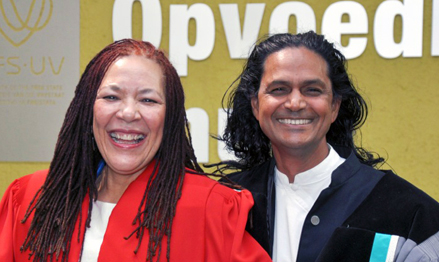Latest News Archive
Please select Category, Year, and then Month to display items
29 March 2023
|
Story Samkelo Fetile
|
Photo Simba Matema
 From left to right: Prof Jean Bernard Lekana-Douki, Director General at the CIRMF; Prof Francis Petersen, Rector and Vice-Chancellor of the UFS; and Prof Jean-Fabrice Yala, Scientific and Technical Director at the CIRMF.
From left to right: Prof Jean Bernard Lekana-Douki, Director General at the CIRMF; Prof Francis Petersen, Rector and Vice-Chancellor of the UFS; and Prof Jean-Fabrice Yala, Scientific and Technical Director at the CIRMF.
The University of the Free State (UFS) recently welcomed senior members from the International Centre for Medical Research in Franceville (CIRMF), Gabon to sign a Memorandum of Understanding (MoU) between the two entities.
CIRMF is a non-profit medical research centre that was established in 1974. Its primary focus is on diagnosing infectious diseases that pose immediate problems in Gabon and the Central African sub-region. The centre is dedicated to improving public health through various initiatives, including the training of Gabonese health executives in doctoral and post-doctoral education.
“The signing of the MoU with CIRMF is a step in the right direction as the UFS continues to strengthen its footprint on the African Continent. This is seminal in driving the university’s internationalisation processes and opening an avenue to expanding research networks, especially in the African continent,” said Bonolo Makhalemele, Coordinator of strategic projects at the Office for International Affairs, UFS.
In the interest of developing broader research collaborations, the CIRMF delegation met with some UFS academics in a series of engagements, particularly in the Health Sciences Faculty and the Natural and Agricultural Sciences Faculty. “The integration of knowledge and practices that emanate from the continent provides opportunities for the co-creation of knowledge that can be shared with the rest of the world,” said Kagiso Ngake, Coordinator for Partnerships, Collaborative Degrees, and Outgoing Mobility at the Office for International Affairs, UFS.
A concrete roadmap was established to formalise the collaborations that resulted from these engagements and will commence as soon as April 2023. “We have laid a solid foundation and are on the way to a strong and rich partnership!” exclaimed Prof Jean Bernard Lekana-Douki, Director General at the CIRMF.
Prof Francis Petersen, Rector, and Vice-Chancellor of the UFS, further highlighted how the newly established partnership with the CIRMF aligns with the mandate of the UFS Vision 130 of expanding the UFS Africa research network.
Rhodes professor calls for accountability in teacher education
2013-11-14
|
 |
Prof Jean Baxen of Rhodes University and Prof Dennis Francis, Dean of the Faculty of Education of the UFS.
Photo: Stephen Collett
15 November 2013 |
Lecture (pdf)
“Our education system needs quality teacher education.”
This was the message from Prof Jean Baxen, Deputy Dean of Research at Rhodes University in Grahamstown. She delivered the Education Public Lecture on ‘The lives of children, citizenship and teacher education: challenges and opportunities’ at the University of the Free State’s Bloemfontein Campus.
Growing up in White River, the rural areas of Eastern Transvaal (as it was previously known), Prof Baxen took the audience on a journey of the imagination. She shared stories of how she and fellow learners walked miles to get to school and how her son found himself in a situation of being unsure about his own racial identity, questioning what it meant to be ‘coloured’. She also related stories of how teachers are not sufficiently prepared to mediate information on HIV/Aids.
These stories revealed how little teachers cared, and also how difficult and challenging it is for learners to cope in such teaching and learning environments – thus calling for quality teacher education.
She stressed the fact that quality teacher education is needed in South Africa to assist in curbing the challenges children and fellow citizens come across in our broader society. “It is important that, as teacher educators, we should groom teachers to find and understand their identity, sexuality, and also the world they live in. There is an urgent need for us to hold ourselves and others accountable and to not distance ourselves and make it someone else’s responsibility – it is our joint responsibility as citizens,” she said.
We need a pedagogy that would navigate and start formulating a language that we could use to face these challenges, she proposed.